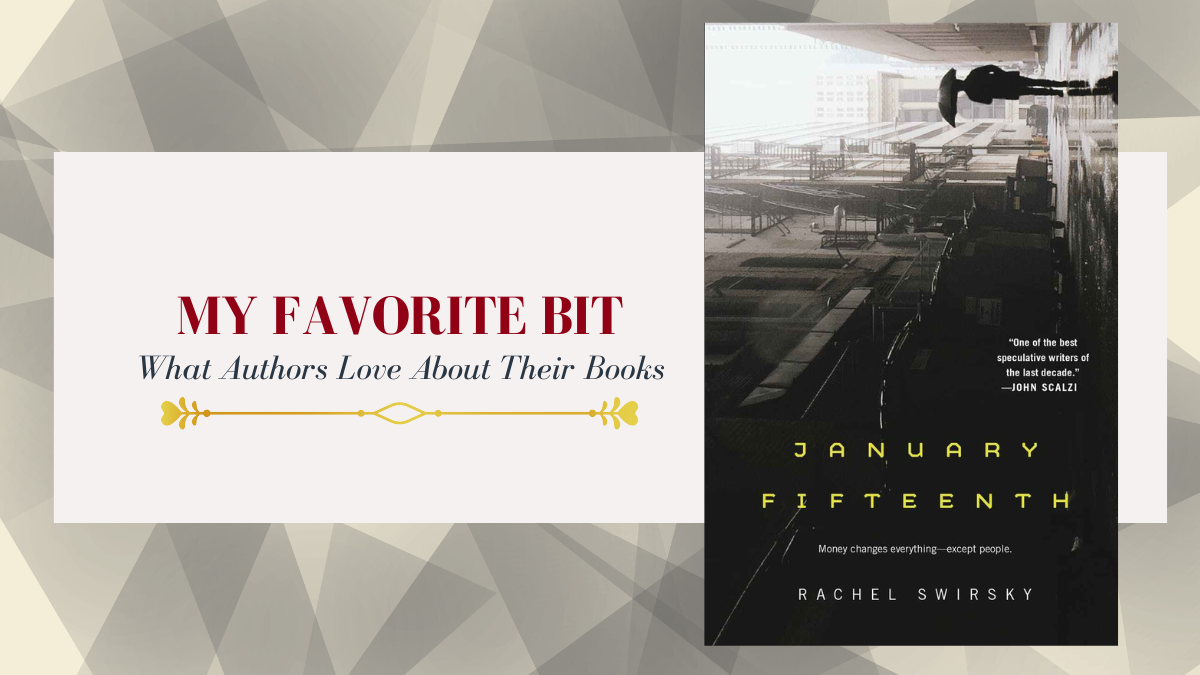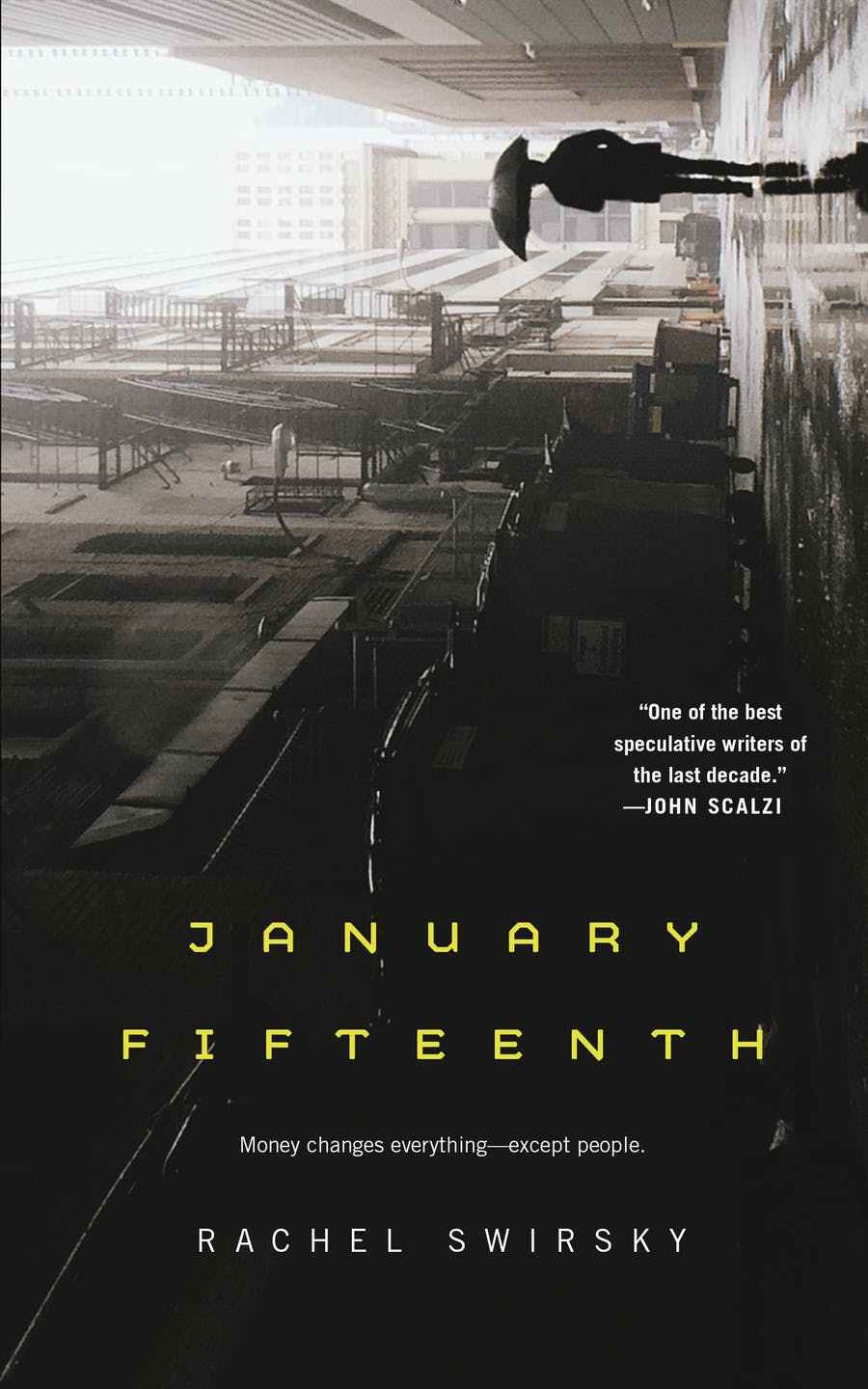
Rachel Swirsky is joining us today to talk about her novella, January Fifteenth. Here’s the publisher’s description:
January Fifteenth—the day all Americans receive their annual Universal Basic Income payment.
For Hannah, a middle-aged mother, today is the anniversary of the day she took her two children and fled her abusive ex-wife.
For Janelle, a young, broke journalist, today is another mind-numbing day interviewing passersby about the very policy she once opposed.
For Olivia, a wealthy college freshman, today is “Waste Day”, when rich kids across the country compete to see who can most obscenely squander the government’s money.
For Sarah, a pregnant teen, today is the day she’ll journey alongside her sister-wives to pick up the payments that undergird their community—and perhaps embark on a new journey altogether.
What’s Rachel’s favorite bit?

RACHEL SWIRSKY
Did you know novellas are long?
OK, maybe not for readers. And maybe not for people who write novels. But for me, who mostly writes short stories? Super long!
Which is to say– I am very proud of my 40,000(!) word novella which just came out from Tor.com.
“January Fifteenth” takes place in a future United States of America with a Universal Basic Income (UBI). It follows four women through the day they collect their payments:
Hannah, a single mother-of-two on the run from her abusive ex-wife.
Janelle, a broke freelance reporter raising her orphaned little sister.
Olivia, a wealthy college student on her first winter break.
Sarah, a pregnant teenager trapped in a fundamentalist cult.
I’ve written about other parts of the novella elsewhere. I discussed some of the questions it raises at John Scalzi’s Big Idea. I posted character excerpts on my blog. But I’m excited to write My Favorite Bit so I can talk about what I loved most– developing the characters’ voices.
I think voice is an integral part of character. People show themselves through actions and dialogue, of course–but voice constantly shows small choices. When a character walks into a room, what do they notice? Paintings on the walls? People’s faces? Or, on the contrary, do they avoid looking at faces?
Characters’ feelings influence how they look at things, too. If they’re in a bad mood, they’ll probably see everything’s bad side. If they’re in a good mood, even a storm on a holiday might be a melody instead of an annoyance.
Is the character wordy? Do they stay on topic or go on tangents? Consider their actions or leap into the fray? Self-reflect or avoid introspection?
To me, that’s all voice. And it’s the fun stuff.
HANNAH
My first narrator, Hannah, is a single mother of two on the run from her abusive ex-wife.
Hannah’s on constant high alert. If fear causes fight, flight, freeze or fawn, Hannah’s in the freeze camp. She wants to stand very still with her kids and stay unnoticed. Like a prey animal, she always has an eye on the environment.
Anxiety makes some people terse, but Hannah’s sentences are long and detailed. She’s too nervous to decide at a glance whether something is a threat or not.
This is an easy voice for me because when I get stuck I can move into Hannah’s perceptions. What’s around her? How does it affect her?
But Hannah could also default to being very slow, concentrating on minor, uninteresting details. That can get boring for the reader and for me! Do I really want to write 300 words about the neighbors’ mailboxes?
Luckily, events– and characters like her nosy landlady and disobedient son– won’t let her stand still.
JANELLE
Janelle used to be a political activist, but after her parents died in a plane crash, she had to take care of her much younger sister, Nevaeh. Now she’s struggling to support a rebellious teenager by working as a freelance reporter, doing the same, boring stories about UBI year after year.
Janelle and Nevaeh are a blast. They’re quick-witted chatterboxes. Even inside her head, Janelle plays with words, goes on dramatic tangents, and trawls for jokes.
I tried to balance the lengths of the novella’s threads, but it’s definitely not split into perfect quarters. Janelle and Nevaeh are part of the reason why. They want to talk forever. Lots of fun, but frustrating when I need them to stop rambling about eighties movies and get on with the plot.
However, their chattiness is great for exposition. Often, characters sound fake if they’re saying things the other person already knows, but there are times people talk like that. They do it when they’re laying the groundwork for explanations. And they especially do it when they’re arguing.
Janelle and Nevaeh? They like to argue.
OLIVIA
Olivia’s a wealthy college student having a reunion in Aspen with her high school friends. Her friends suck, especially the grandiose William who’s entering a contest to see who can waste their UBI most extravagantly.
Unlike Janelle and Nevaeh, Olivia’s not self-aware. She doesn’t understand that she’s her friends’ scapegoat. She doesn’t know why their jokes about her being stupid and slutty make her feel bad.
Olivia’s easy to pick on because she’s confused by social interactions and eager to please. Like many people who’ve been bullied, she’s internalized the insults. Even in her head, she dismisses her accomplishments, and thinks of herself as stupid and boring.
She has no political awareness either. While others argue about the merits of UBI, Olivia barely registers the debate. For one thing, she doesn’t think she’s smart enough for her opinion to matter.
Olivia’s perspective was tricky. So many things happen outside her frame of reference (especially once she’s intoxicated), but I still need to show the reader what’s going on, especially when I’m setting up her character arc. It’s basically an exercise in subtext. It was pretty fun.
SARAH
Sarah’s a pregnant teenager trapped in a fundamentalist, polygamist offshoot of the Latter Day Saints. (Let me emphasize, mainstream Mormons oppose these cults!) In the real world, some LDS cults exploit existing welfare systems to fund human rights abuses such as exiling boys and “bleeding the government beast” by claiming money for them anyway.
As Sarah treks with the cult’s other women to the city to pick up their UBI, Sarah dwells angrily on the memory of her younger brother’s exile. She’s starting to realize that excuses like “this boy didn’t do his chores” or “that boy paid inappropriate attention to the prophet’s wives” are made up to push the boys out.
I started with a solid sense of Sarah’s character– pragmatic, taciturn, and very, very angry– but she was still difficult to write. She’s the opposite of Janelle and Nevaeh. While they want to ramble, Sarah’s intensely focused on her bottled anger. When she looks at a cat, she thinks “cat.” She doesn’t consider its fur pattern or temperament or her aunt’s three-legged tabby.
She’s terrified to show vulnerability, for good reason. She’s already outcast for her acidic disposition.
Anger and fear of vulnerability stifle her inner monologue, too. Her thoughts spiral about her brother, her pregnancy, and her bullying sister wives. There’s so much she doesn’t want to think about, and yet can’t avoid thinking about, that she’s circular and terse.
Although Sarah’s pulled out of herself by her socially awkward cousin Agnes, her sections still came out shorter than the others. Nevertheless, for me, they’re some of the most emotionally intense.
A VOICE OF THEIR OWN
I’m glad the novella length gave me so much space to get to know Hannah, Janelle, Olivia, and Sarah. I don’t know if I’ll write them again– though it’s tempting to let Janelle and Nevaeh chatter and see what happens– but they definitely became people to me with voices of their own.
LINKS:
January Fifteenth Universal Book Link
BIO:
Rachel Swirsky holds an MFA from the Iowa Writers Workshop where she, a California native, learned about both writing and snow. She recently traded the snow for the rain of Portland, Oregon, where she roams happily under overcast skies with the hipsters. Her fiction has appeared in venues including Tor.com, Asimov’s Magazine, and The Year’s Best Non-Required Reading. She’s published two collections: Through the Drowsy Dark (Aqueduct Press) and How the World Became Quiet (Subterranean Press). Her fiction has been nominated for the Hugo Award and the World Fantasy Award, and twice won the Nebula.
